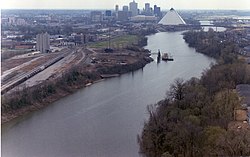This article has multiple issues. Please help improve it or discuss these issues on the talk page . (Learn how and when to remove these messages)
|
Harbor Town | |
|---|---|
| Neighborhood of Memphis | |
 | |
 | |
| Country | United States |
| State | Tennessee |
| County | Shelby County |
| City | Memphis |
| ZIP Code | 38103 |

Harbor Town is a new urbanist-style neighborhood in Memphis, Tennessee. Harbor Town sits atop 132 acres (53 hectares) on a sandbar in the Mississippi River known as Mud Island. It was developed in 1989, [1] and was a collaborative effort of Memphis developer Henry Turley, RTKL of Baltimore, and the Looney Ricks Kiss architectural firm from Memphis. The Henry Turley Company stated that the neighborhood intends to "emphasize the human rather than the automobile." [2] Nowadays Harbor Town is considered dense and walkable, known for its traditional row houses, shops, parks, and marina.






